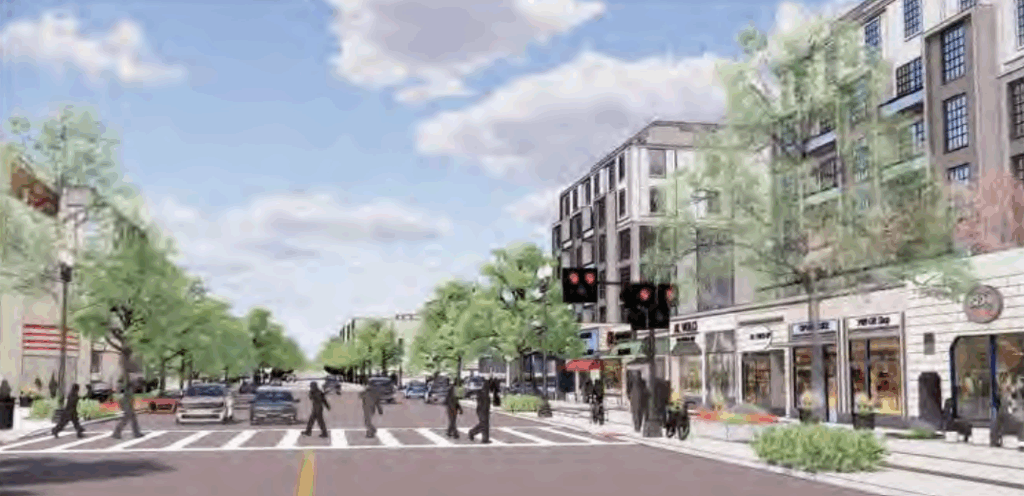On Tuesday, December 9, the Montgomery County Council voted to approve the University Boulevard Corridor Plan by a vote of 7-3. The plan creates a strong framework for safer streets, a wider variety of housing options, a connected bike network, and new homes and retail near transit.
Category: Zoning

DC Alert: Support more homes for Cleveland Park and Woodley Park

Send a letter of support by Dec. 1, 2025 to the DC Zoning Commission in support of upzoning along Connecticut Avenue, Zoning Case No. 25-09.
Tell the DC Zoning Commission that you support the proposed new mixed-use zones (Zoning Case No. 25-09) to permit taller buildings to allow for more homes, including affordable homes, above shops for the Cleveland Park and Woodley Park business districts on Connecticut Avenue. Any new buildings would be subject to the design guidelines adopted by the Historic Preservation Review Board. The zoning proposal would also remove the cap on restaurants in these business districts, which will help fill in vacant storefronts and attract new businesses. Send your letter before December 1.
Sign up in advance to testify on Dec. 1 at 4 pm. The hearing is virtual!
Image by DC Office of Planning, ZC No. 25-09.

Council needs your input on University Boulevard
Help us get the word out on University Boulevard!
DC Testimony Workshop: Preparing for Wisc. Ave. Rezoning
Date: Nov. 10 2025, 7 – 8:30 pm
AGENDA
Introductions – name, neighborhood, motive
How to testify
- Sign up & what to expect at virtual hearing 4pm, ~5pm proponents start
- Principles for testifying
- Proponent with or without recommended improvements
- What’s motivating you to be here
- Tell your personal housing story, don’t worry about details, don’t be an expert
- Dos/Donts – don’t oppose because it’s not good enough, instead support & urge to make it better; do make it personal rather than being an expert; only speak for allotted 3 minutes; always be polite & respectful of commissioners & all others – including opponents; don’t worry – Commissioners want to hear from you they are not are not out to get you
- Sample testimony- below
Peter Shapiro – How to have the most impact
How to testify – check in
- Ask participants: What’s your main argument – why do you care about approving this upzoning? (one sentence)
3. Q & A – resource people
Resources

Support transit and inclusive housing options in the University Boulevard Corridor Plan
The University Boulevard Corridor Plan envisions a community with safer streets, thriving local businesses, better public transit, and more housing choices to meet people’s needs at all ages and stages of life.
Visit our landing page at smartergrowth.net/ubc to take action and learn more about the plan.

Ward 3 Smart Growth & Affordable Housing Happy Hour
Residents and community activists got together in Tenleytown on October 7 to socialize and talk about opportunities to build more sustainable inclusive and walkable neighborhoods, especially in Ward 3.

Big win in Montgomery County! Council allows more multi-family homes on county corridors
Yesterday, the Montgomery County Council voted 8-3 to pass Zoning Text Amendment (ZTA) 25-02. The legislation will allow more housing types, like townhouses or small apartment buildings, along major corridors, creating more homes near jobs and amenities.
CSG in the News: In raucous session, County Council votes 8-3 to approve controversial housing zoning change
July 23, 2025 | Ginny Bixby | Bethesda Today
The Coalition for Smarter Growth released a statement prior to Tuesday’s vote voicing support for the zoning change. The nonprofit advocates for “walkable, bikeable, inclusive, and transit-oriented communities” in the Washington, D.C. area, according to its website.
“By making it easier to build more duplexes, triplexes, and small apartments near transit and jobs, [the] ZTA is an important step toward more sustainable housing options in Montgomery County,” the statement said. “Measures like this that take on the structural problems feeding our housing shortage are a necessary step to achieve our shared vision of a sustainable, inclusive county for all.”
Read the full story here.
CSG in the News: Montgomery County Council to vote on ‘missing middle’ housing plan
July 22, 2025 | Maureen Umeh | FOX 5 DC
“Montgomery’s economy, the economy of Maryland, is in some trouble right now. If we cannot provide housing, that’s affordable to the workforce, they can’t come to the county and provide their talents and services to the county,” said Stewart Schwartz with the Coalition for Smarter Growth. “Companies will not come to the D.C. region and to Montgomery County if they don’t believe housing is affordable for their workers, they’ll go to places where it is more affordable.”
Read the full story here.
CSG in the News: Montgomery County Faces Pushback On ‘Landmark’ Housing Package
July 21, 2025 | Jon Banister| Bisnow
Carrie Kisicki, the Montgomery County advocacy manager for pro-housing group Coalition for Smarter Growth, said requiring property owners to go through an approval process would make these multifamily projects take more time and money to pursue. But she supports the overall proposal because it creates a pathway to building more housing on lots that have long been restricted to detached single-family homes.
“We’re still living in that world where people who 10 or 20 years ago would’ve been able to buy a starter home, or young professionals who would’ve been able to buy an apartment in the county, started to not be able to do that because of how little we’ve been building the types of housing that people needed,” Kisicki said.
“So this is to me a landmark package because it shows we’re willing to go back and look at some of those things we’ve taken for granted about where we build homes or don’t build homes.”
